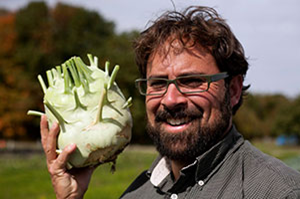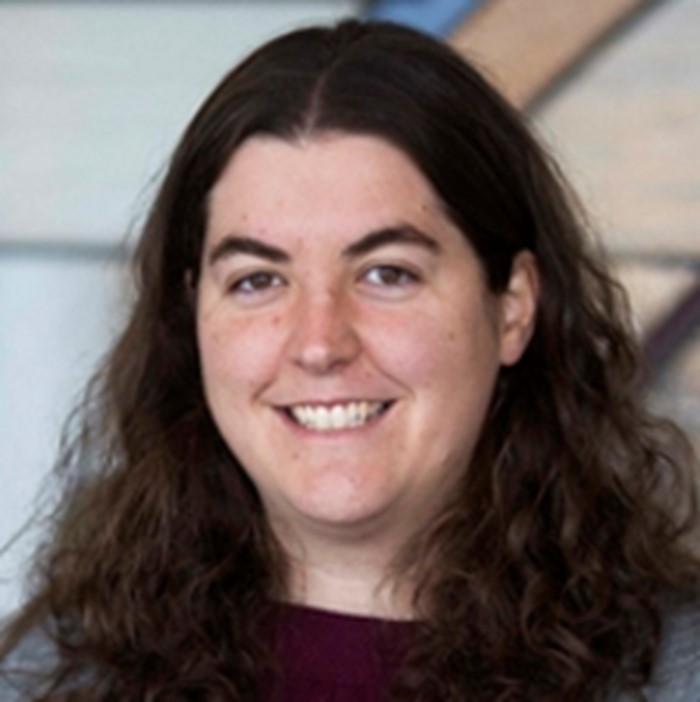The UofM Campus Farm has a goal of reaching carbon neutrality for all emissions generated and electricity used on-site by 2026. Students on this team will support this goal by developing and implementing an energy management system that allows for a solar-powered produce cooler and EV delivery van to operate as a combined system minimizing or eliminating the need for grid power in the farm’s produce storage and delivery systems.
Abstract:
The Campus Farm at Matthaei Botanical Gardens is a student-driven multi-stakeholder living learning lab for sustainable food systems work built around principles of food grown by students for students, on-farm carbon-neutrality, diversity, equity, inclusion, and justice, in a learning community that fosters student leadership development and high-impact teaching, research, and learning opportunities. The team will build an energy management system that will optimize the following operations
- Control of electricity from the photovoltaic panels to power the campus farm’s refrigeration cooler or van battery as needed.
- Adjustment of cooling system operation (cooling and cool air intake).
- Utilization of the van battery to power the cooler at night while keeping the van battery at an acceptable level of charge based on the delivery mileage for the next day.
Software will be delivered to perform a variety of functions: real-time controls, optimized scheduling of charging cycles, and forecasting load requirements based on past use patterns and expected weather forecasts. Together, these elements will work together to demonstrate climate-forward system designs that minimize grid electricity and carbon emissions. In addition, this innovation will serve as a demonstration of a reproducible model for local farms seeking carbon neutral solutions to cold storage and delivery needs.
Impact:
Food systems contribute roughly 25% of global greenhouse gas emissions. Climate forward solutions and systems designs that address greenhouse gas emissions generated in both the cold storage and transportation portions of the food system have the potential to substantially reduce these emissions. Solutions that link lower cost or grid independent solar power with cooler operations and transportation solutions can create increased sustainability while improving farm function, reducing crop/food loss, and decreasing greenhouse gas emissions.
This system will address three common farm business needs: energy, transportation, and refrigeration, deployable at virtually any site, while making systems changes to reach carbon neutrality goals. The Campus Farm is a living learning lab site for interdisciplinary food systems work on campus. The project will serve to highlight student engagement opportunities in clean energy and sustainability spaces on campus. In addition to courses and students, the 500K plus annual visitors to Matthaei Botanical Gardens and Nichols Arboretum each year will learn about climate forward solutions in food systems and beyond.
Scope:
Minimum Viable Product Deliverable (Minimum level of success)
- Basic energy management system that uses simple forecasts of demand (vehicle usage), weather, cooler demand to implement simple, rule-based schedules and real-time controls.
- Implementation of a thermostatically controlled cold air intake system that allows the cooler to utilize cool/cold outdoor air for cooling to help reduce energy consumption and assist in the optimization of the above energy management system.
- Public facing visualization; user interface
Expected Final Deliverable (Expected level of success)
- Addition of advanced forecasting (forecasts + forecast errors) of vehicle usage, cooler usage/demand, and weather to create optimal schedules and more advanced real-time controls.
Stretch Goal Opportunities: (High level of success)
- Optimize charging/use cycle to minimize the carbon emissions of power drawn from the grid.
- Incorporate real-time feedback from the EV van, cooler and weather to improve performance.
Controls / Power and Energy Systems (2-3 Students)
Specific Skills: Control system design. Power and energy system design, including optimal performance incorporating needs forecasting.
Likely Majors: CE, EE, ISD-ESE
Thermodynamics (1-2 Students)
Specific Skills: Understanding of basic thermodynamics, ideally applied in controls or energy systems. Comfort with data analysis and forecasting.
Likely Majors: ME, ChE, MSE
General Software Development (2-3 Students)
Specific Skills: General full system software design implementing management functions and providing UI for energy management and real-time status display for visitor education.
Students must have completed EECS 281 or equivalent before Winter 2024.
Likely Majors: CS, IOE
Additional Desired Skills/Knowledge/Experience
- Project based engineering experience. Strong interest and ability in hands-on engineering projects. Student engineering competition team experience is a strong plus.
- Students with experience or interest in carbon neutrality, clean/renewable energy systems, life cycle assessment, energy justice, public impact, sustainable systems and/or sustainable food systems
- Demonstrated leadership in curricular or personal activities.
- Practical data modeling experience incorporating forecasting models.
- Experience with power design and/or energy management systems
- Experience working with weather data would be a big plus.
- Practical experience working with mechatronics/basic controls/servo motors.
Sponsor Mentor

Jeremy Moghtader
Campus Farm Program Manager
Jeremy has 20+ years of experience in sustainable food systems work with expertise in ecological and organic production for local and regional markets, new and beginning farmer training, year-round cold climate food production in passive solar hoophouses, and regional food system development. He was a founding member of the Food System Economic Partnership and Tilian Farm Development Center. Currently as the program manager of the UM Campus Farm at Matthaei Botanical Gardens, a student driven living learning lab for sustainable food systems work on campus, Jeremy collaborates with students and faculty from across campus on high impact research teaching and learning opportunities in sustainable food systems with a focus on carbon neutrality and food justice.
Faculty Mentor

Prof. Johanna Mathieu
Electrical Engineering and Computer Science
My research focuses on ways to reduce the environmental impact, cost, and inefficiency of electric power systems via new operational and control strategies. I am particularly interested in developing new methods to actively engage distributed flexible resources such as energy storage, electric loads, and distributed renewable resources in power system operation. This is especially important in power systems with high penetrations of intermittent renewable energy resources such as wind and solar. In my work, I use methods from a variety of fields including control systems and optimization. I also use engineering methods to inform energy policy.
Weekly Meetings: During the winter 2024 semester, the Campus Farm team will meet on North Campus on Wednesdays from 3:00 – 5:00 PM.
Work Location: Work will take place in Ann Arbor on North Campus and/or on-site at the Campus Farm. MDP will provide transportation as required to the Campus Farm.
Course Substitutions: CE MDE, ChE Elective, CS Capstone/MDE, EE MDE, CoE Honors, IOE Senior Design, MECHENG 490, SI Elective/Cognate
Citizenship Requirements: All students may participate in this project. International Students: CPT declaration (curricular practical training) is NOT required for this project because the Campus Farm is part of the University.
IP/NDA: Students will sign standard University of Michigan IP/NDA documents.
Summer Project Activities: No summer activity will take place on the project.
Learn more about the expectations for this type of MDP project
